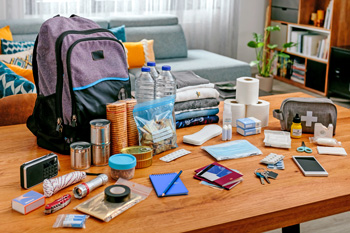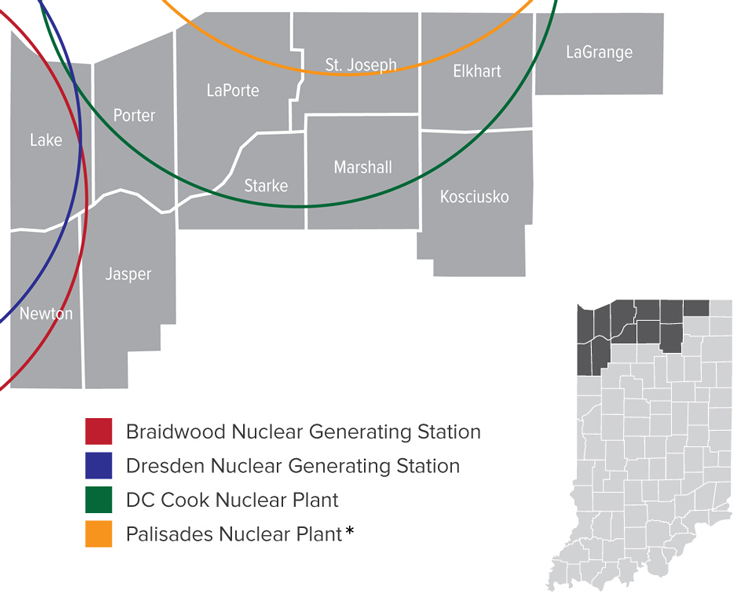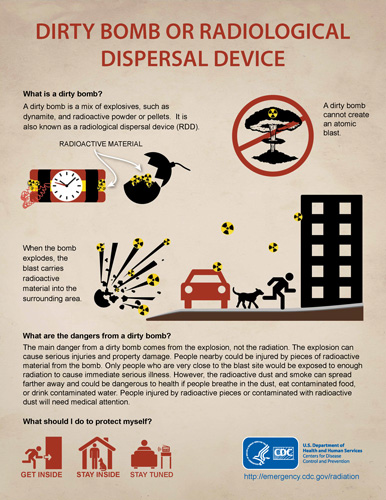Radiation Preparedness
- Get Prepared
- Emergencies
- Current: Radiation Preparedness
Radiation cannot be seen, smelled, felt or tasted, but it is present in your everyday life, whether it is the small amount of radioactive elements that occur naturally in your body, the earth or air. But in a radiological emergency, such as a nuclear power plant accident or weaponized radioactive material, uncontained radioactive material can significantly increase the amount of radiation you receive to harmful levels. Plan ahead to minimize the time you are exposed to radioactive materials, maximize your distance from the source and shield yourself from both external and internal exposure.
Radiation Emergency Safety Tips
Quick Tips
- Create disaster kits and plans for your household.
- Identify possible shelter locations in areas you frequent.
- In general, during a radiation emergency, go inside, stay inside and stay tuned to guidance from safety officials and first responders.
- Follow instructions from local officials during emergencies.


Always Be Prepared
Take these steps to be ready before a radiation emergency occurs:
- Create and share your emergency plans with your household.
- Build a disaster kit that is easily accessible. Check the supplies every six months to replace any expired items, such as medications, food and batteries. Also replace the water to keep it fresh.
- Have multiple ways to receive emergency alert information. A hand-crank or battery-powered radio is a great resource in case there is a power outage.
- Identify shelter locations near where you spend much of your time, including along your route to and from work each day. You may not be at work or at home when a radiation emergency occurs, so pay attention to potential shelters like the windowless center of multistory buildings, basements or tunnels. Contact your local government to find out if there are any public buildings in your area that are designated as fallout shelters.
Nuclear Power Plant Accident
There are no operational nuclear power plants in Indiana, although there is a research and test nuclear reactor at Purdue University in West Lafayette. Even though there are no operational nuclear power plants in the state at this time, Hoosiers should still be aware and prepared for incidents that could occur at nuclear plants in Illinois and Michigan. Eleven counties in northern Indiana would be those most affected in an incident because they may be within a 50-mile radius of one of those nuclear plants.
Nuclear plants are built to withstand a variety of natural and severe events. Because of many safeguards and highly skilled individuals operating nuclear plants, it is very unlikely that a serious accident will occur. However, if there is an emergency situation with a nuclear plant, residents who live within 10 miles of a nuclear facility will be notified and may be instructed to shelter in place or evacuate. Emergency situations may take hours or days to develop, so there would be sufficient time for the public to take precautions. Those living farther away, such as in Indiana, should pay attention to local radio and TV stations but may not need to take protective actions. News reports will let the public know if actions are needed, and if there are instructions given, be sure to follow them.
Immediately following notification of an incident, Indiana public safety officials will dispatch personnel to collect samples of milk, forage, seasonal crops, processed foods, soil and water within a 50-mile radius. These samples will be analyzed to determine what areas, if any, have been contaminated and to what degree. This information will be used to determine the best course of action to protect the public and food supply.
What To Do
Listen for instructions: Tune your television or radio to your local news stations for information. Public safety and emergency response officials will share information and instructions to the public through official communication channels and news outlets. Continue to watch or listen for updates, and follow their instructions.
Do not consume potassium iodide (KI): Do not consume potassium iodide without being instructed to do so by a public health official. It can have harmful health effects, especially if not needed or not taken properly. Potassium iodide is only helpful in specific situations for certain types of people. Do not use table salt or foods high in salt instead; they will not help with radiation poisoning and could be harmful if eaten too much.
Do not destroy any animals, crops, milk or feed supplies: Unless directed to do so by emergency response officials, do not destroy plants, animals or food. The environmental damage caused by an incident may be short-lived, and steps can generally be taken to make a full recovery.
Be prepared to take action: Beyond the 10-mile zone around a nuclear plant, you will most likely not be asked or required to take protective action, but be prepared if emergency response officials direct you to take action. Know your household emergency plan and have your disaster kit available. Farmers should be aware that officials might recommend that livestock be brought indoors and placed on stored feed sources.
Radiological Dispersal Device (Dirty Bomb)
Radiological dispersal devices (RDD) spread radioactive material to harm people. This could involve placing a container of radioactive material in a public place, dispersing radioactive material from the air or combining conventional explosives with radioactive material (dirty bomb). These devices are much smaller than nuclear weapons and do not create atomic blasts. Their deadly effects are much more limited, as not enough radioactive material may be present to cause severe illness or death.
In the case of dirty bombs, the effects may not extend much beyond the immediate area of the explosion itself. However, some radioactive materials, if they are dispersed in the air, could have the potential to affect several city blocks or a few miles with radioactive dust or smoke. Due to difficulties in designing RDDs with doses high enough to cause immediate health effects or deaths in many people, dirty bombs would likely be used for the purposes of contaminating places where people work or live and causing anxiety in those who think they are exposed to the radiation.
What To Do
Stay away: If there is a visible plume or cloud of smoke or dust, avoid that area.
Avoid inhalation: Prevent breathing in radiation (internal exposure) by covering your mouth and nose with materials such as tissues, filters or damp cloths.
Go inside and stay tuned: Get inside a building with closed doors and windows, then stay inside and pay attention to guidance from public safety officials and first responders.
Decontaminate yourself: Removing your outer layer of clothing can remove up to 90% of radioactive material, so remove contaminated clothing as soon as you get indoors, and then place it in sealed containers, like plastic bags. Take a shower to gently wash your skin and make sure no radioactive material can be ingested or transferred to your face when eating, drinking or smoking. Put on clean clothes.
Find more details on how to self-decontaminate at the U.S. Centers for Disease Control and Prevention website.
This video was created by the New York City Emergency Management Agency. Sign up for Indiana's Get Prepared email list.
This video was created by the New York City Emergency Management Agency. Sign up for Indiana's Get Prepared email list.
Nuclear Explosion
Nuclear weapons use nuclear reactions to create an explosion that is much more powerful than conventional explosives and creates a blast wave, intense light, heat and radiation. These weapons may be bombs or missiles, and their explosions produce nuclear fallout, which is a collection of radioactive material that falls from the mushroom cloud and contaminates anything it lands on, like the ground, structures and buildings. Fallout can be spread hundreds of miles by the wind.
Nuclear explosions are very deadly. Severe injury, such as skin burns and blindness, and death may occur from the explosion itself. High levels of radiation near the source can cause radiation sickness (or acute radiation syndrome), which may take days or weeks to develop, depending on how much radiation is absorbed by the body.
What To Do
Take cover immediately: If you are warned that a nuclear explosion is going to occur, pay attention to instructions from public safety officials. You may be ordered to evacuate or find shelter immediately. Shelter in place as far below ground as you can, but any protection is better than none. Seek the basement or middle of the nearest building, away from outer walls and the roof so that you can put as many surfaces between you and the explosion and fallout. Brick or concrete buildings are best.
If you are caught outside and cannot get to a building immediately, lie flat on the ground and cover your head to avoid the blast wave and debris, which may take 30 seconds or more to hit you. Do not look at the flash or fireball because it can blind you. Cover your mouth and nose with a mask, cloth or towel to reduce inhalation of radiation. Take shelter as soon as you can afterward.
After the explosion, you may have 10 minutes or more to find shelter before fallout arrives. Get inside a multistory building or basement within a few minutes of the explosion. Underground parking garages may provide good shelter too. To keep out radioactive particles, close doors, windows and vents, and turn off heating and cooling systems.
Stay inside: Most fallout occurs in the first 24 hours near and downwind from the explosion. Stay inside your shelter for at least 24 hours unless told by public safety officials to do otherwise, or if there is another immediate hazard such as a fire, gas leak, building collapse or severe injury. Be prepared to stay inside for multiple days if necessary. If you may have been exposed to fallout, self-decontaminate as soon as possible.
Stay informed: Pay attention to radio, TV and internet sources for news and instructions from public safety officials. If you were evacuated, do not return to the affected area until told by local officials that it is safe to do so.
Resources
Websites
- IDHS Radiological Emergency Preparedness Program
Indiana Department of Homeland Security - Radiation Awareness
Indiana Department of Homeland Security - Radiation Emergencies
Ready.gov - Radiation and Health
U.S. Centers for Disease Control and Prevention - How To Prepare for a Radiological Emergency
U.S. Nuclear Regulatory Commission



